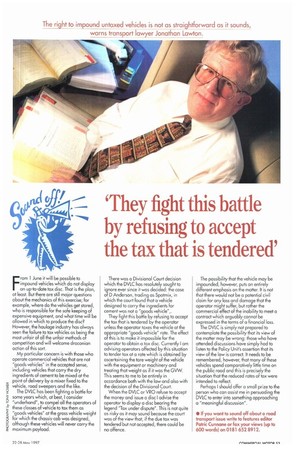'They fight this battle
Page 55

If you've noticed an error in this article please click here to report it so we can fix it.
by refusing to accept the tax that is tendered'
From 1 June it will be possible to impound vehicles which do not display an up-to-date tax disc. That is the plan, at least. But there are still major questions about the mechanics of this exercise; for example, where do the vehicles get stored, who is responsible for the safe keeping of expensive equipment, and what time will be allowed in which to produce the disc? However; the haulage industry has always seen the failure to tax vehicles as being the most unfair of all the unfair methods of competition and will welcome draconian action of this sort.
My particular concern is with those who operate commercial vehicles that are not "goods vehicles" in the accepted sense, including vehicles that carry the dry ingredients of cement to be mixed at the point of delivery by a mixer fixed to the vehicle, road sweepers and the like. The DVLC has been fighting a battle for some years which, at best, I consider "underhand", to compel all the operators of these classes of vehicle to tax them as "goods vehicles" at the gross vehicle weight for which the chassis-cab was designed, although these vehicles will never carry the maximum payload. There was a Divisional Court decision which the DVLC has resolutely sought to ignore ever since it was deciced: the case of D Anderson, trading as Spotmix, in which the court found that a vehicle designed to carry the ingredients for cement was not a "goods vehicle",. They fight this battle by refusing to accept the tax that is tendered by the operator unless the operator taxes the vehicle at the appropriate "goods vehicle" rate. The effect of this is to make it impossible for the operator to obtain a tax disc, Currently I am advising operators affected by this situation to tender tax at a rate which is obtained by ascertaining the tare weight of the vehicle with the equipment or machinery and treating that weight as if it was the GVW. This seems to me to be entirely in accordance both with the law and also with the decision of the Divisional Court.
When the DVLC or VRO refuse to accept the money and issue a disc I advise the operator to display a disc bearing the legend "Tax under dispute". This is not quite as risky as it may sound because the court was of the view that, if the due tax was tendered but not accepted, there could be no offence.
The possibility that the vehicle may be impounded, however, puts an entirely different emphasis on the matter. It is not that there would not be a potential civil claim for any loss and damage that the operator might suffer, but rather the commercial effect of the inability to meet a contract which arguably cannot be expressed in the terms of a financial loss.
The DVLC is simply not prepared to contemplate the [Possibility that its view of the matter may be wrong: those who have attended discussions have simply had to listen to the Policy Unit's assertion that its view of the law is correct. It needs to be remembered, however; that many of these vehicles spend comparatively little time on the public road and this is precisely the situation that the reduced rates of tax were intended to reflect.
Perhaps I should offer a small prize to the person who can assist me in persuading the DVLC to enter into something approaching a "meaningful discussion".
• If you want to sound off about a road transport issue write to features editor Patric Cunnane or fax your views iup to 600 words) on 0181 652 8912.
















































































































